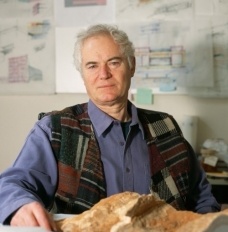
newspaper
news
By Matevž Čelik
On a rainy Friday morning of September 17 2010, Vojteh Ravnikar deceased. He spread his enthusiasm for architecture in many ways, especially in the articles he used to distribute in photocopies. Nearly 30 years ago, when Slovenia was still a part of socialist Yugoslavia, he brought world architects to Piran, where he created the "Piran Days of Architecture" which for many years has been the only international architectural seminar in Central and Eastern Europe. Vojteh Ravnikar was an architect who built important housing projects. Thus at least with as much enthusiasm he built awareness of the importance of architecture and changed the attitude of Slovenian socialist society towards living space. "So far as you moan, people only feel sympathy with you. If you want them to take you into account you have to establish your position which would then be relevant in the discourse ..." he wrote.
During Ravnikar's Piran Days of Architecture every last Friday of November, lecture rooms of the Faculty of Architecture in Ljubljana were empty. For the upcoming generation of architects, it was an event which was refreshingly relaxed, perhaps even subversive. In three days students could get more architecture, than at the Faculty in both semesters. In 1980s and 90s in Piran you could meet future Pritzker Prize winners: Alvaro Siza, Peter Zumthor, Christian de Portzamparc or Sverre Fehn. In the evening students were drinking beers with David Chipperfield. Vojteh Ravnikar with his organizing committee seemed to open up the horizon of young architects who were wrongly deprived of.
At the moment of Slovenia's independence Vojteh Ravniakr saw opportunities to install Slovenian architectural production more firmly in the European space. He started publishing Piranesi magazine with Tomaž Brate, subtitled ambitiously as the first Central European journal of the culture of space. He opened his first Editorial with the slogan "The World is your Playground". In the pulse of his office one could get a really liberating feeling that the work of the architect is not something academically rigorous, but it is something more like a game that is delightful and entertaining and opens doors to the world.
In the mid 90s when he began teaching at the Faculty of Architecture in Ljubljana, Vojteh Ravnikar spread this positive atmosphere quickly into his cabinet and the lecture room. He changed the student work from the list of duties and dates into pleasant and creative socializing. For Vojteh Ravnikar houses were stories and they should therefore be narratives. The search of their happy ending became a team work. He believed joy is hidden in good houses, which is not always determined rationally, but it had to be constantly detected. " I do not believe in something that happens just like that if it is not coming to pass before that."
Ravnikar's office structure was loose enough for strong and capable individuals to enter and in a given time knew how to establish their own position. Therefore Ravnikar actually became the godfather of new generation of Slovenian architects who left into the world and later took it as their "playground" to "become relevant in the discourse": Bostjan Vuga (Sadar+Vuga), Spela Videcnik (Ofis architects), Aljosa Dekleva (Dekleva Gregoric), Marusa Zorec, Ales Vrhovec, Arne Vehovar, Apollonia Sustersic and many others.
Thus Ravnikar left his walls-lines that are so well laid on Karst, in Nova Gorica, Piran, Ljubljana, Bled, and other places in Slovenia ... But he gave his country much more. Architecture as something open and liberating. Vojteh Ravnikar bequeathed to Slovenia architecture as a story with a happy ending.


